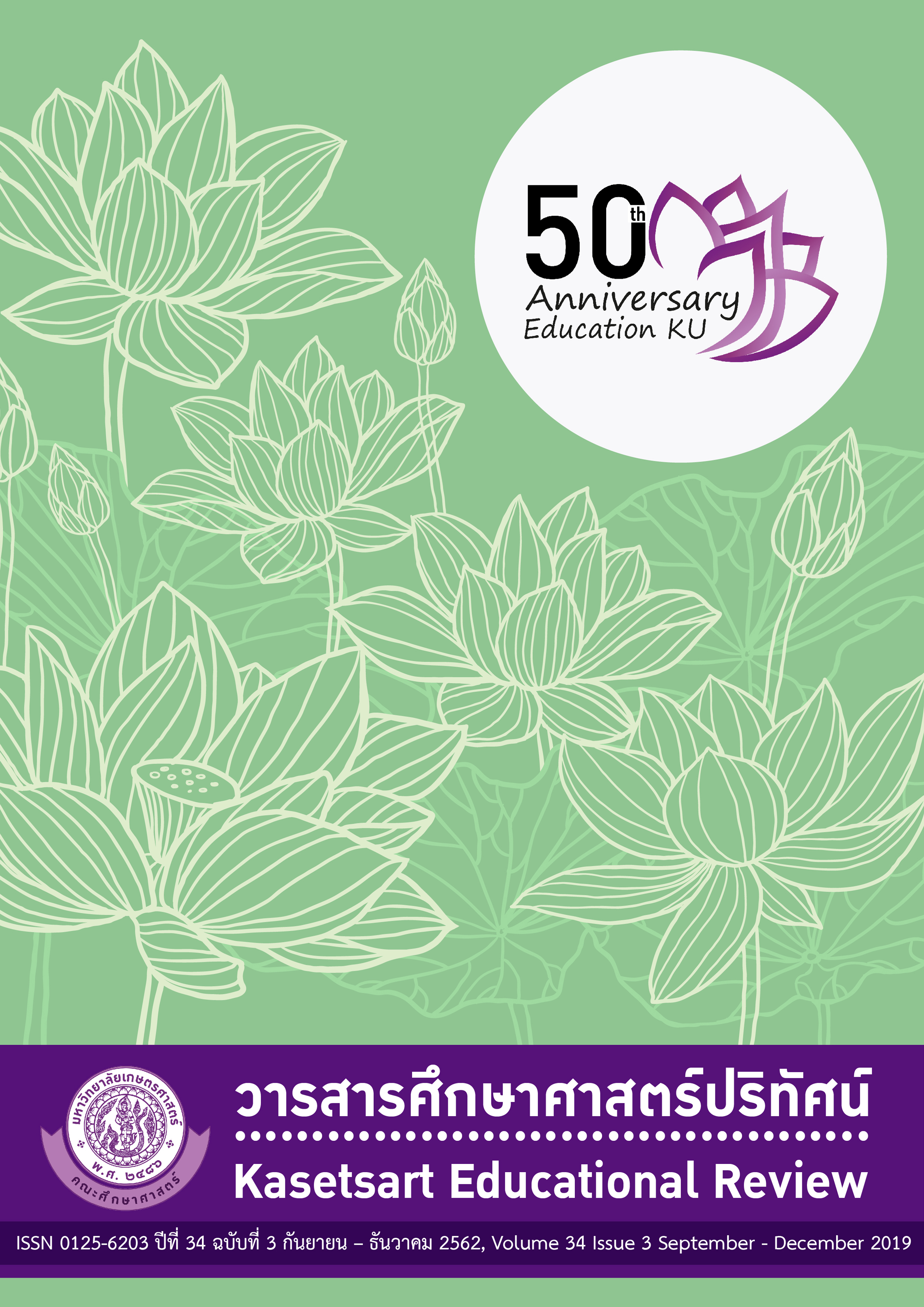ผลการจัดการเรียนรู้โครงงานสะเต็ม ( STEM Project ) ที่มีต่อผลสัมฤทธิ์ทางการเรียนวิชาเทคโนโลยีสารสนเทศและการสื่อสาร ความสามารถในการแก้ปัญหาและความพึงพอใจต่อการจัดการเรียนรู้ของนักเรียนชั้นมัธยมศึกษาปีที่
คำสำคัญ:
โครงงานสะเต็ม (STEM Project)บทคัดย่อ
การวิจัยครั้งนี้มีวัตถุประสงค์1) เพื่อเปรียบเทียบผลสัมฤทธิ์ทางการเรียนก่อนเรียนและหลังเรียนของนักเรียนที่ได้รับการจัดการเรียนรู้โครงงานสะเต็ม (Project STEM) 2) เพื่อเปรียบเทียบความสามารถในการแก้ปัญหาก่อนเรียนและหลังเรียนของนักเรียนที่ได้รับการจัดการเรียนรู้โครงงานสะเต็ม (Project STEM) 3) เพื่อหาประสิทธิภาพแผนการจัดการเรียนรู้วิชาเทคโนโลยีสารสนเทศและการสื่อสาร โดยการจัดการเรียนรู้โครงงานสะเต็ม (Project STEM) และ 4) เพื่อศึกษาความพึงพอใจต่อการจัดการเรียนรู้ของนักเรียนที่ได้รับการจัดการเรียนรู้โครงงานสะเต็ม (Project STEM) กลุ่มตัวอย่างที่ใช้ในการวิจัย คือ นักเรียนชั้นมัธยมศึกษาปีที่ 5 โรงเรียนโคกก่อพิทยาคม อําเภอเมือง จังหวัดมหาสารคาม องค์การบริหารส่วนจังหวัดมหาสารคาม จํานวน 52 คน เครื่องมือที่ใช้ในการศึกษาเป็นแบบสอบถาม 2 ตอน ตอนที่ 1 แบบสอบถามเกี่ยวกับสถานภาพของผู้ตอบแบบสอบถาม ตอนที่ 2 แบบสอบถามปลายปิด เป็นแบบมาตราส่วนประมาณค่า (Rating Scale) 5 ระดับ แบบสอบถามเกี่ยวกับความต้องการและข้อเสนอแนะอื่นๆ ที่เกี่ยวกับการ
จัดการเรียนรู้โครงงานสะเต็ม (Project STEM) พบว่า
1. สถานภาพของผู้ตอบแบบสอบถามจากกลุ่มตัวอย่างจํานวน 52 คน พบว่า ส่วนใหญ่เป็นเพศหญิง โดยมีประสบการณ์ในการเรียนโครงงานระหว่าง 1-5 ปีมากที่สุด
2. ผลการเปรียบเทียบผลสัมฤทธิ์ทางการเรียนก่อนเรียนและหลังเรียนของนักเรียนที่ได้รับการจัดการเรียนรู้ตามแนวคิดสะเต็มศึกษา (STEM Education) ของนักเรียน โดยภาพรวมพบว่าคะแนนที่ได้จากการจัดการเรียนรู้วิชาเทคโนโลยีสารสนเทศและการสื่อสาร เรื่องโครงงานสะเต็มมีค่าคะแนนเฉลี่ย 25.13 คิดเป็นร้อยละ 83.73 อยู่ในระดับมาก
3. ผลการเปรียบเทียบความสามารถในการแก้ปัญหาก่อนเรียนและหลังเรียน โดยภาพรวมคะแนนเฉลี่ยหลังการจัดการเรียนรู้สูงกว่าก่อนการจัดการเรียนอย่างมีนัยสําคัญทางสถิติที่ระดับ .01
4. ผลการศึกษาผลการใช้แผนการจัดการเรียนรู้วิชาเทคโนโลยีสารสนเทศและการสื่อสาร เรื่องโครงงานสะเต็ม ของนักเรียนชั้นมัธยมศึกษาปีที่ 5 โดยภาพรวมอยู่ในระดับมากคิดเป็นร้อยละ 85.45
5. ผลการศึกษาความพึงพอใจต่อการจัดการเรียนรู้วิชาเทคโนโลยีสารสนเทศและการสื่อสาร เรื่องโครงงานสะเต็ม ของนักเรียนชั้นมัธยมศึกษาปีที่ 5 โดยภาพรวมพบว่าอยู่ในระดับมากมีค่าเฉลี่ย เท่ากับ 4.27 ส่วนเบียงเบนมาตรฐานเท่ากับ 0.42
เอกสารอ้างอิง
Basic Education Commission. (2009). Basic Education Core Curriculum B.E. 2551 (A.D. 2008). Learning Area of Science. Bangkok: Kuruspa. [in Thai].
Boonchob, D. & Ruangrit, N. (2015). A comparison result project-based learning between group investigation with blended learning and normal group in computer project subject of students. Journal of the Veridian E-Journal, Silpakorn University Humanities, Social Sciences, and Art, 2(8), 92-107. [in Thai].
Buapai, T and others, 2017. A Learning Activity Model for Learning Activity Management for Integration into Graduate Studies, Journal of Information Technology Management and Innovation, 4(1), 174-183. [in Thai].
Chulawattanatol, M. (2013). STEM Education Thailand and STEM Ambassadors. The institute for the promotion of teaching science and technology. [in Thai].
Intalapaporn, C. & others. (2015). The study guidelines for learning management of the STEM Education for elementary students, Veridian E-Journal, Silpakorn University, 8 (1), 62-74 [in Thai].
Jitaree.R and others. (2017). The Development of Instruction Model Based on Constructivist Learning Theory and STEM Education Approach to Enhance Analysis Thinking and Scientific Literacy for Mathyomsuksa 1 Student. Journal of Education Naresuan University, 19(2),202-213. [in Thai].
Karnsombut, S. (2014). The Development of computer project activities for Mattayomsuksa 6 students Wongnoi School.Retrieved from: https://www.gotoknow.org/
Kemwimoottiwong, C. (2016). Action Research: Student Development for Activities Planning Design of STEM Education with Active Learning. Phikanatesan Journal, 13(2), 109-127. [in Thai].
Khammanee, T. (2011). Teaching Pedagogy. Bangkok. Chulalongkorn University Press. [in Thai].
Ministry of Education. (2017). The Development plan of ministry of Education, 13(2) [in Thai].
Ruanthongdee, T. & others. (2016). A Development of Cartoon multimedia By Using STEM Education In Computer For Grade 3 Students Case Study of Watchantharam School, National Conference on Technology and Innovation Management Proceeding. [in Thai].
Rungluksanameesri, W. (2008). Effects of instruction emphasizing engineering design process on scientific problem solving ability and integrated science process skills of lower secondary school students in demonstration schools. Thesis of Master degree in Education Chulalongkorn University. [in Thai].
Seneewong, S. (2013). STEM Education By using Origami frog. Bangkok. The institute for the promotion of teaching science and technology. [in Thai].
Siripattrachai, P. (2013). STEM Education and 21st Century Skills Development. Executive Journal, 33(2),49-56. [in Thai].
Thongchai, A. (2015). What is Technology and Engineering on STEM Education. Journal of The institute for the promotion of teaching science and technology,42(185), 10-13. (in Thai).
The institute for the promotion of teaching science and technology. (2002). Handbook of Science Education. Bangkok. IPST, 25-51. [in Thai].
The institute for the Promotion of Teaching Science and Technology. (2003). Basic Educational Core curriculum in Science Education. Bangkok. [in Thai].
The Institute for the Promotion of Teaching Science and Technology. (2003). Guideline of teaching science for kindergarten students. Bangkok, IPST, 4-39. [in Thai].
_____. (2005). The Development of Inquiry Cycle or 5Es to enhance higher thinking skill for science teacher in secondary school.Bangkok, IPST, 14-19. [in Thai].
_____. (2013). STEM Education handbook. Bangkok, IPST, 8-12. [in Thai].
Tuansulong, T. (2008). Effects of Science, Technology and Society Approach on Achievement and Problem Solving Ability of Mattayomsuksa Five Students. Thesis of Master degree in Education, Prince of Songkla University. [in Thai].
Wongchachom,P. & Cojorn. K. (2016). A Development of Creative Thinking and Learning Achievement of Matthayomsueksa 5 Students based on the STEM Education Cooperated with Project-based Learning. Journal of Education, Mahasarakham University, 10 Special Edition. [in Thai].
ดาวน์โหลด
เผยแพร่แล้ว
ฉบับ
ประเภทบทความ
สัญญาอนุญาต
บทความทุกบทความเป็นลิขสิทธิ์ของวารสารคณะศึกษาศาสตร์ มหาวิทยาลัยเกษตรศาสตร์ วิทยาเขตบางเขน
วารสารศึกษาศาสตร์ปริทัศน์ (Kasetsart Educational Review)






